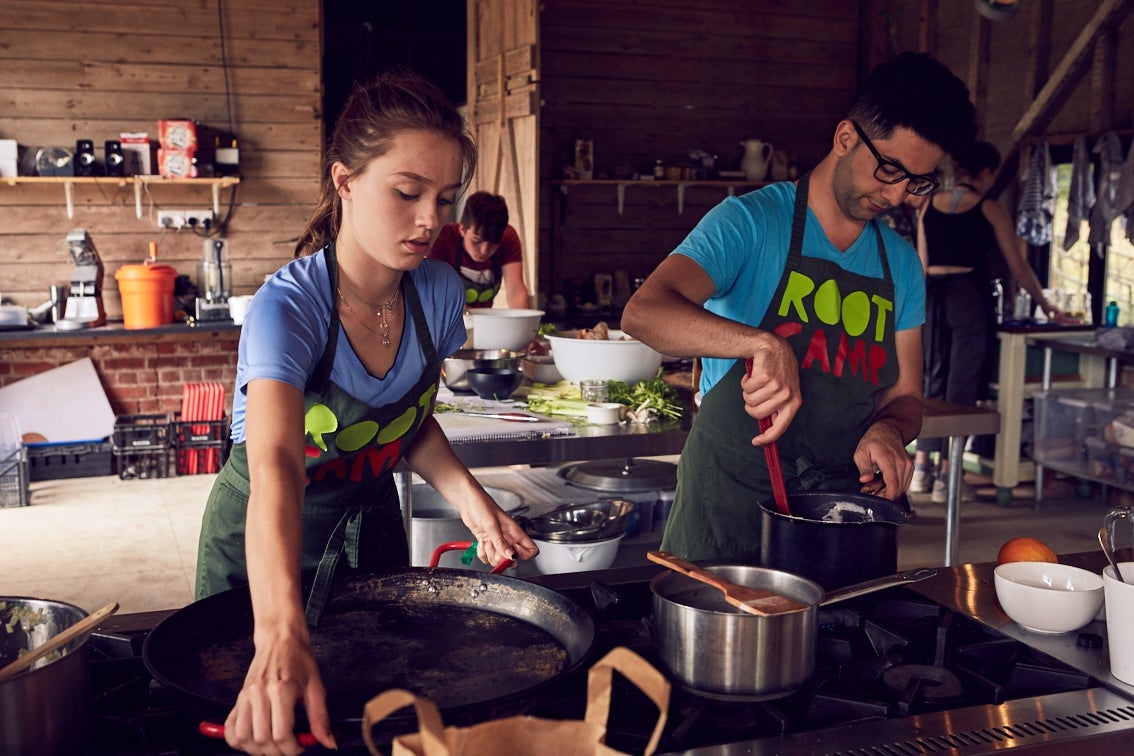The summer camp teaching teenagers how to cook
Craving independence and adulthood comes hand in hand with teenagers, but one of the most important life skills we can impart to them is the lesson of cooking. Julia Platt Leonard meets the founder of Root Camp, which does just that

Anyone with a teenager knows they’re hardwired to crave independence. As parents, we work frantically to arm them with the skills they’ll need to survive. We pester them to go to school, do homework, get a weekend job and be responsible. But how many of us teach them how to cook? And if we don’t, are we missing the most basic life skill of all?
“You can’t really call yourself independent if you can’t cook yourself a meal,” says Cassia Kidron, founder of Root Camp – a residential field-to-table cookery school for young people aged 15-21. This summer alone, around 160 kids will go to Root Camp either in Suffolk or in Bologna, Italy. It’s the second year they’ve held programmes outside the UK but for Kidron, the idea behind Root Camp started much closer to home with her own kids.
“I looked around me and thought none of these kids know how to cook. How are they going to go out into their lives without those skills? What are they going to be eating? How are they going to nourish themselves?” So Kidron – who started cooking when she was a teenager – decided to hold weekend cooking classes with her kids and their friends. The idea grew and quickly Kidron realised it wasn’t just the mechanics of cooking – the slicing and dicing and sauteing and grilling – that mattered, but showing kids the link between what they were cooking and where it came from.
She held the first residential Root Camp at Riverford Organic Farm in Devon. The day was split with half the time spent learning how to cook as a group and the other picking, planting, foraging, even making sausages and chorizo and visiting an abattoir. “It was a bit crazy and it was a bit of a mad idea, but it stuck this mad idea and actually as I’ve gone on, I’ve felt it’s not a mad idea at all.”
From the beginning, Kidron was committed to making the Root Camp experience possible for kids from all backgrounds. She says that at least 25 per cent of kids on each programme receive a bursary and sometimes that number can climb up to 50 per cent – no small accomplishment for the charity. “Our bursary fund is hugely precious to us,” she says, but acknowledges that financially, it’s not always easy to maintain.
But diversity is critical for many reasons, not least of all the rise in obesity amongst children living in deprived areas in the UK who are two times as likely to be obese compared to those in the least deprived. And the “obesity gap” has widened in recent years, particularly in the 10-11 age group. Kidron – and others working in food – feel that building a connection with what we eat is one of the best ways to encourage a healthy relationship with food throughout the teenage years and into adulthood.
Root Camp at Riverford Organic Farm, Devon
Show all 12Encouraging healthy eating is a challenge, in large part Kidron says because we’re faced with so many easy, cheap food options. “But that food isn’t necessarily the most nourishing food,” she says. We’re also faced with food on TV that’s looks glossy and perfect – an image that Kidron says can be intimidating and off-putting for teens. “It’s like that model with a perfect figure or the perfect clothes. That’s not really the reality and it’s not really the reality of food. The reality of food is that it’s crooked and it’s imperfect and it’s got earth on it.”
Does Root Camp work? Kidron points to their own research that shows an overwhelming majority of campers feel Root Camp influences how they think about food, seasonality, sustainability and where and how they buy food. “We know they go back and cook more for their families,” she adds.
Quite a result for only six days but perhaps not so surprising when you consider that everything Root Camp does is focused on getting people to think and enjoy food more. “Actually, it very quickly embeds quite a lot of values.”
For those who attend, Root Camp can be a seminal experience, so much so that the assistant on a recent programme was a past participant while their camp manager was on the first ever Root Camp.
With such success, the only question is why aren’t there more Root Camps? Kidron says that’s the goal. She’s working on creating a permanent venue in Devon where they can “spread out a bit” and extend their educational outreach work as well.
But for now, it’s back-to-back summer camps at a location in Suffolk as well as Root Camp in Italy. No doubt growth will come but Kidron says the message will stay the same: “Cook it from scratch and you know what’s in your food and you’re in control of your life and body.” It sounds like one of the best life lessons anyone could give their teen.
To book a course, visit rootcamp.co.uk
Subscribe to Independent Premium to bookmark this article
Want to bookmark your favourite articles and stories to read or reference later? Start your Independent Premium subscription today.

Join our commenting forum
Join thought-provoking conversations, follow other Independent readers and see their replies